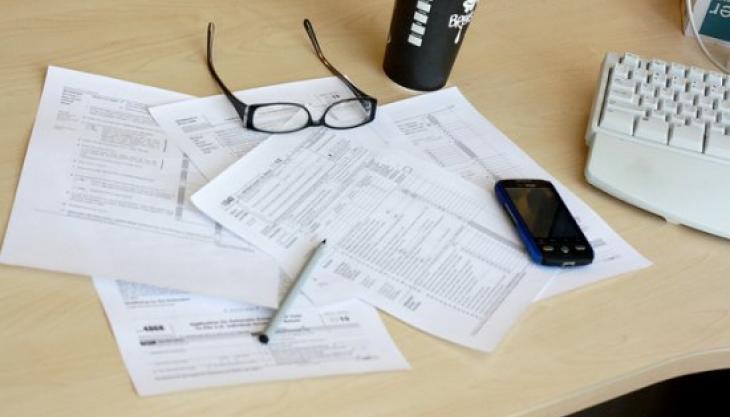New IRS Ruling Helps Student Loan Debtors Save for Retirement
Submitted by Rachel R on Fri, 08/24/2018 - 10:16am

IRS ruling may help student loan debtors
Image by MoneyBlogNewz via Flickr
With more than $1.5 trillion now owed in student loans, it’s a debt crisis with no end in sight. One of the issues facing consumers with student loans is deciding how (and even if) they can save for retirement while dealing with this debt. Workers of all ages should be saving for retirement, but it’s more critical if your employer offers a 401(k) match.
Not taking your 401(k) benefits means losing money
When you don’t take advantage of this benefit, you’re leaving money on the table that you’ll need in years to come. A new IRS ruling could change the way we treat student loan repayment and saving for retirement. The private ruling issued August 17 allowed one company that wasn’t publicly named to change their 401(k) match policy and it could be a game changer if it’s more broadly applied.
Expanding 401(k) benefits to student loans
The anonymous employer requested the IRS grant it permission to alter its 401(k) match policy. Under their existing policy, the company paid a 5% salary match into 401(k) accounts for workers contributing at least 2% of their salary into their retirement account. They requested the IRS allow them to contribute 5% of employee salary into the 401(k) based on student loan repayment.
The IRS agreed that employees contributing 2% of their salary towards their student loans would qualify for a 5% employer contribution into their 401(k). The company asked to be able to donate to the employee’s retirement account without the employee paying tax on that amount, even if that employee is not contributing to their retirement account.
Essentially, the student loan payments would act in lieu of retirement contributions, and the employer would make the 5% contribution. That would enable employees with student loans to pay their debt while still accumulating retirement funds. The tax code related to 401(k) accounts addresses a “contingent benefit.”
Contingent benefit provision
Employers are not allowed to make other benefits contingent on 401(k) participation. For instance, employers couldn’t say that you must contribute 2% to your 401(k) to qualify for health or disability insurance. The sole exception to the contingent benefit rule is the tax-free 401(k) employer match. In this case, the 401(k) match would be contingent on student loan repayment.
That’s why the unnamed employer applied to the IRS to ask for an exception to make the match contributions contingent on the student loan payments of at least 2% of salary. The IRS decided that the company could require the student loan payment at the set percentage to qualify for the employer match outside the bounds of the standard contribution/match arrangement.
Expanding 401(k) benefit could change student loans
Currently, less than 5% of companies offer any type of student loan benefits. But with the job market becoming much more competitive, employees can be more selective. That means employers need to step up their game to attract and retain top talent. Offering student loan benefits is one way to differentiate themselves from other firms.
Even though the IRS ruling didn’t name the company, the ruling itself is public. That means other companies will likely take notice of this new measure now available to help employees saddled with student loan debt. Other employers that wish to follow suit must also file a request for approval of the contingent benefit, but with the precedent in place, it shouldn’t be too difficult.
There’s also a financial barrier to obtaining a similar private letter ruling for interested companies. The cost varies from $250 up to $50,000 for a private letter ruling (PLR). Plus, there’s the cost of hiring a tax attorney experienced in these matters to draft the request. It takes two to six months (or longer) to obtain the ruling with no guarantee that the request will work.
If you’re stuck with unaffordable student loans, bankruptcy may help, depending on your unique circumstances. Read reviews from our clients then contact the Law Offices of John T. Orcutt. Call +1-833-627-0115 to schedule a free student loan bankruptcy consultation at one of our locations in Raleigh, Durham, Fayetteville, Wilson, Greensboro or Wilmington.
Resources:
Student loan private letter ruling
Debts Hurt! Got debt? Need help? Get started below!
Serving All of North Carolina
- Bankruptcy Attorneys Raleigh NC (North)
- Bankruptcy Attorney Fayetteville NC
- Bankruptcy Attorney Durham NC
- Bankruptcy Attorneys Wilson NC
- Bankruptcy Attorneys Greensboro NC
- Bankruptcy Attorneys Southport NC
- Bankruptcy Attorneys Wilmington NC
Bankruptcy Attorneys Raleigh NC (North)
6616 Six Forks Rd #203 Raleigh, NC 27615 North Carolina
Tel: (919) 847-9750

Bankruptcy Attorney Fayetteville NC
2711 Breezewood Ave Fayetteville, NC 28303 North Carolina
Tel: (910) 323-2972

Bankruptcy Attorney Durham NC
1738 Hillandale Rd Suite D Durham, NC 27705 North Carolina
Tel: (919) 286-1695


Bankruptcy Attorneys Greensboro NC
2100 W Cornwallis Dr. STE O Greensboro, NC 27408 North Carolina
Tel: (336) 542-5993

Bankruptcy Attorneys Southport NC
116 N Howe St. Suite A Southport, NC 28461 North Carolina
Tel: (910) 218-8682

Bankruptcy Attorneys Wilmington NC
116 N. Howe Street, Suite A Southport, NC 28461 North Carolina
Tel: (910) 447-2987
